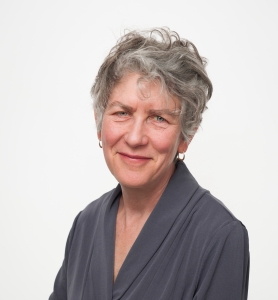The Causative Factor by Megan Staffel
Fiction faculty member Megan Staffel’s new novel, The Causative Factor, was published on October 22nd by Regal House Publishing. Read an excerpt below:
From The Causative Factor
The class meets on the top floor of an empty house the university no longer maintains. They are artists in the making and the filthy surroundings suit them more than a normal classroom. The stairs are slanted, the windows leaky, and spider webs and mouse droppings are everywhere. In the bathrooms the plumbing is noisy, the faucets rusted. Rubiat, one of the most vocal members of the class, christens it “gothic.” Someone else says, “haunted.”
At first, it’s Rubiat she notices. He’s thin and tall, and dresses in bright colors. There’s always a red scarf wrapped around his neck, boots on his feet that strike the wooden floors loudly. She finds him pretentious.
The man she’s taken by is their teacher Denton, a dancer, actor, artist from England. He’s at their school for only a semester as an artist in residence and this is his only class. Called Body Expression, it’s a practicum in Performance Art, a new and popular discipline at their art school.
Denton seems barely older than they are, and there’s a sly, restrained quality about him she likes, as though he’s enjoying his own private joke which he might, or might not, reveal. He speaks to them as friends, and the fact that he’ll be making the final judgment and giving the grade is irrelevant. He tells them this. What’s important is experience. He wants them to have a full, immersive experience. He wants them to lose themselves in work. Work, he tells them, is sacred, it is a way of communicating their deepest thoughts and feelings, a way of telling the world who they are and what they know. He makes these statements as he walks up and down in the long, windowed room at the top of the house, his jagged blond hair and blue jeaned figure moving in and out of the light. They are mesmerized. He has an intensity that feels, on its own, like the definition of an artist. It’s something Rachel hopes to achieve, and it starts with a determination to be bold, to embody purpose, to speak clearly and directly about the human spirit.
In September, Denton lectures. He lays out the history of performance art, showing how it developed from dadaism, a movement that celebrated the irrational. Denton shows them old footage of performances from the Cafe Voltaire in Zurich. They discuss the dancing (mimicking machines), the music (atonal, unmelodic), the costumes (playful and childish), and the spectacle of adults dismantling the scaffolding of reason as a way to protest the atrocities of the First World War. They create their own performances, using materials they find in the house, pots, lampshades, curtains, silverware, and it all ends in laughter. Dadaism takes them to Surrealism, where the focus moves into sculpture and painting, while still maintaining loyalty to the irrational. Denton shows them how the surrealists celebrated disorder, taking familiar objects out of their normal contexts and putting them into new and strange juxtapositions. They play Exquisite Corpse, marveling at what can happen when control is removed from the creative act.
Rachel likes going back in time to see how it all started. And she likes the drama of Denton’s beautiful English voice in the dark room as he projects one painting after another that proves the extraordinary is out and about in the world. All a person has to do is loosen the order of things. For viewing films and projections, they move from the light filled room at the top of the house to a dark, shuttered kitchen, large enough for rows of folding chairs.
In October they begin long-term projects. Denton pairs them in what seems like a spontaneous and arbitrary manner, though later, she will wonder. When he says Elsayem/Goodwin she sees Rubiat look around the room. Rachel knows Elsayem is Rubiat’s last name and she suspects that when he discovers she’s Goodwin, he will feel the same disappointment.
Their assignment is to identify their partner’s essential quality. “Describe it in words and then find a way, without using props or costumes, to express it through movement.” Denton takes them back down to the kitchen to show them film footage of dancers, actors, comedians and invites them to steal any move that might be useful. “Your objective is to know your partner intimately. And by the way, I’m not suggesting sex.” Everyone laughs. “That’s your choice of course” a tiny smile crosses his face, “but talking can also achieve intimacy. Interview them. But it’s not really facts you’re interested in, you want to find their deepest motivation, the hidden foundation of their character, that quality that makes them the person they are. That’s what you’re after. We’ll call it the causative factor, the one characteristic emotion from which their words and actions derive.




